We have just completed six months of car camping throughout North America in our converted SUV camper van. One thing we have realized, and a major problem we faced daily, was learning that overland travel is not conducive to a green lifestyle. We’ve had to be extra diligent in order to stay responsible and eco-friendly while on our road trip. Gas emissions, single use food containers, plastic bags. It never ends. But if you are interested in ways to reduce your environmental impact while traveling and overlanding, there are many tips to stay eco-conscious. Although it may seem counterintuitive, green travel is possible.
Recently, we connected with Evelin from Overlandsite.com who wrote an amazing post on how they travel while keeping environmental sustainability in mind. These guys are experts when it comes to overlanding and green travel. Evelin wrote up a quick summary for us on how to achieve eco-friendly overlanding. We are happy to post it here for you all to peruse, but you can check out the full post over on their site (and it comes with an awesome infographic!).
If you are new to the overlanding, camper van game, check them out. You will learn a lot.
And if you are a seasoned overlander, drop us your best tips on green travel in the comments below! 👇
You can also check out Fuel For The Sole’s other overland related posts here:
- Why You Should Consider Overland Camper Travel
- The Most Essential Items You Need for Car Camping
- Which Camper Vehicle is Best for You: A Van, Bus or RV?
How to Maintain Environmental Sustainability While Traveling Overland
Submitted to and Edited by Fuel For The Sole, Written by Evelin from Overlandsite.com
When someone wants to go overlanding, they typically choose a large vehicle with a gas or diesel engine. These vehicles tend to have low mpg’s, which can have a tremendous environmental impact because of the amount of carbon dioxide and fossil fuel remnants sent through the air.
There are quite a few things members of the overlanding community can do to stay responsible, decrease their impact on the environment and preserve overland travel as an activity for future generations.
So, let’s see what we can do as campers, overlanders, nature enthusiasts, and eco-junkies for the environment. Here are fifteen green travel tips you can gradually incorporate into your car camping trips to make the world just a little bit better one step at a time.
Recycling and Waste Management
One thing we noticed while travelling in America, in particular, was that it was rare to find a recycling bin anywhere. This proved to make recycling very difficult while overlanding. It’s not always easy to access recycling bins in the wilderness, but this doesn’t mean you should throw your recyclables away.
Two tips here.
One, break down your groceries while you are still at the grocery store.
Very often we will organize our groceries and food storage while still in the store’s parking lot. Remove any packaging from the product and transfer the food into reusable storage containers. You can then take advantage of the store’s recycling bins to get rid of your waste.
Two, consider finding a low profile recycling system that can fit in your overland vehicle or camper van. We went as simple as possible and stored our recyclables in a reusable bag and emptied it any time we saw a recycling bin.
If you are looking for something a little more sturdy and clean looking, try The DRIVE Bin. It also has a lid you can close to help keep smells from escaping into your tiny home on wheels.
Or, if you have space, consider a stackable recycling bin system like the Suncast Hopper Bins to keep things super clean and organized.
Take Care of Human Waste
Everyone poops. This is a fact of life and an issue that is bound to come up when overlanding. When you have to go, go responsibly. Dig a hole that is 8 inches deep and 200 feet away from any water sources. Bury it and cover it up with natural materials.
Toilet paper can either be packed out, burned, or if you find a good biodegradable toilet paper, it can be buried as well.
If you have the space, and crave a more comfortable bathroom experience, there are tons of portable toilet and privacy options for your camper vehicle.
You can keep it real simple with the Reliance Products Luggable Loo which is essentially a toilet seat on top of a 5 gallon bucket. Hey, it does the trick.
For something a little more traditional, the Camco Portable Toilet provides a comfortable seat and flushing ability.
Or get super fancy with a WolfWise Pop-up Tent which gives you your own private area to poop or shower in.
Avoid Water Waste – How to Save on Water
Fresh water is a limited resource, so you will need to cherish your water supply while off-road travelling. Make sure you are not wasting water on unnecessary things.
Some green travel tips on how to conserve your water while overlanding:
Make peace with the dust on your camper. Your vehicle is going to get dirty. Learn to love it and wait a little longer in between car washes.
Shower less often. You may need to learn to love your natural odour and take a few days in between each shower.
If you are using the shower in your RV, consider using a bucket on the ground to catch the water that flows while waiting for the hot water to kick in. Ultimately this can be used to wash dishes or in your hand-operated washing machine.
Save up your laundry for a few weeks and save it for the next holiday park.
Install low-flow taps and water-saving showerheads in your camper.
Always ensure that you catch a rain shower. Have your vehicle rigged up to catch and channel rainwater directly into your water tank.
If you are travelling long-term, consider modifying your rig to redirect the water from the sink and shower so it can be used to flush your toilet.
Whenever you can, fill your water storage containers with water from mountain springs, streams, rivers etc. If you have a proper filtration system you can fill up on water anywhere you see it.
Reduce Your Speed and Travel Slow
We love overlanding and the freedom of the open road. But in order to stay responsible while travelling, we try to slow down as much as we can. Drive slowly, stay in one area for long periods of time, get out of your car and explore the land by hiking and biking. This is the key to green travel.
By simply reducing your speed and covering fewer miles each day, you will lessen your carbon emissions.
Slow Travel = Green Travel
Maintain Your Vehicle and Tires
You’ll also want to keep your tires inflated to the maximum recommended pressure on the bitumen and have your vehicle regularly serviced to keep it running smoothly.
Also, do what you can to inspect your roof and reduce your vehicle’s drag.
A lot of overlanding pollutants come from vehicles that have leaks, especially from liquids like oil and coolant. Remember to thoroughly inspect your vehicle before going anywhere and to look for potential drips and leaks.
And when you are ready to have your oil change done, look for a company that will dispose of and recycle oils responsibly.
The bonus to this is that you can save yourself a lot of money on fuel and vehicle maintenance.
Eat Local, Fresh and Shop at Farmers Markets
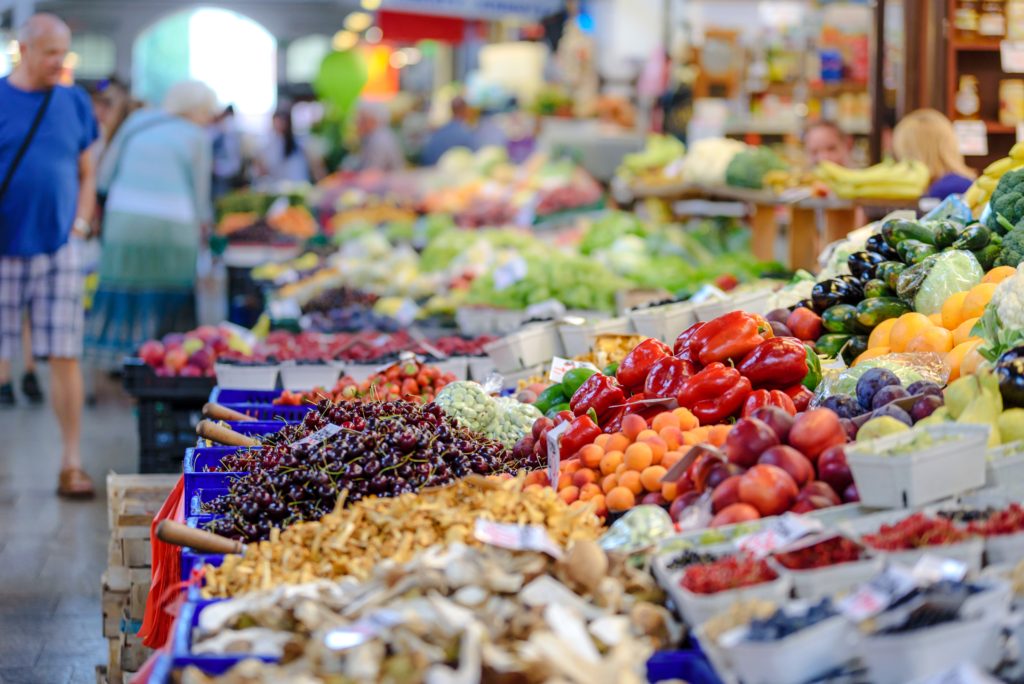
While on the road, take advantage of all the local produce and specialties. Local food from farmer’s markets will be fresher, healthier and have much less impact on the environment.
It is tempting while overlanding to pack along lots of pre-packaged foods. But this type of eating will generate a ton of waste. Not to mention the lack of nutrition in these foods.
Instead of bringing all of that waste with you, shop local and buy organic fresh fruits, vegetables and meats.
Purchasing locally grown food ensures it has fewer food miles and uses a lesser amount of fuel to transport and refrigerate it. You’ll be helping to support the environment by shopping this way.
Use Green and Eco-Friendly Cleaning Products
Biodegradable products are your friend when you are overlanding. By using natural products alternatives you won’t have to worry about chemical runoff seeping into the land and local waterways.
Natural ingredients, such as vinegar and baking soda, are not only cheap but responsible ingredients as well. And they are also very effective. They can be used to clean all surfaces from your bathroom to your kitchen.
And for a mould-resistant finish, mix clove oil with one litre of water, wipe down your surfaces and allow to dry.
Eliminate Disposable and Single-Use Products
Popular single-use products while traveling, like batteries and propane canisters, are some of the worst things for the environment because they are used and disposed of so quickly.
Instead, opt for USB rechargeable gadgets, solar panels and solar powered products, and refillable gas bottles.
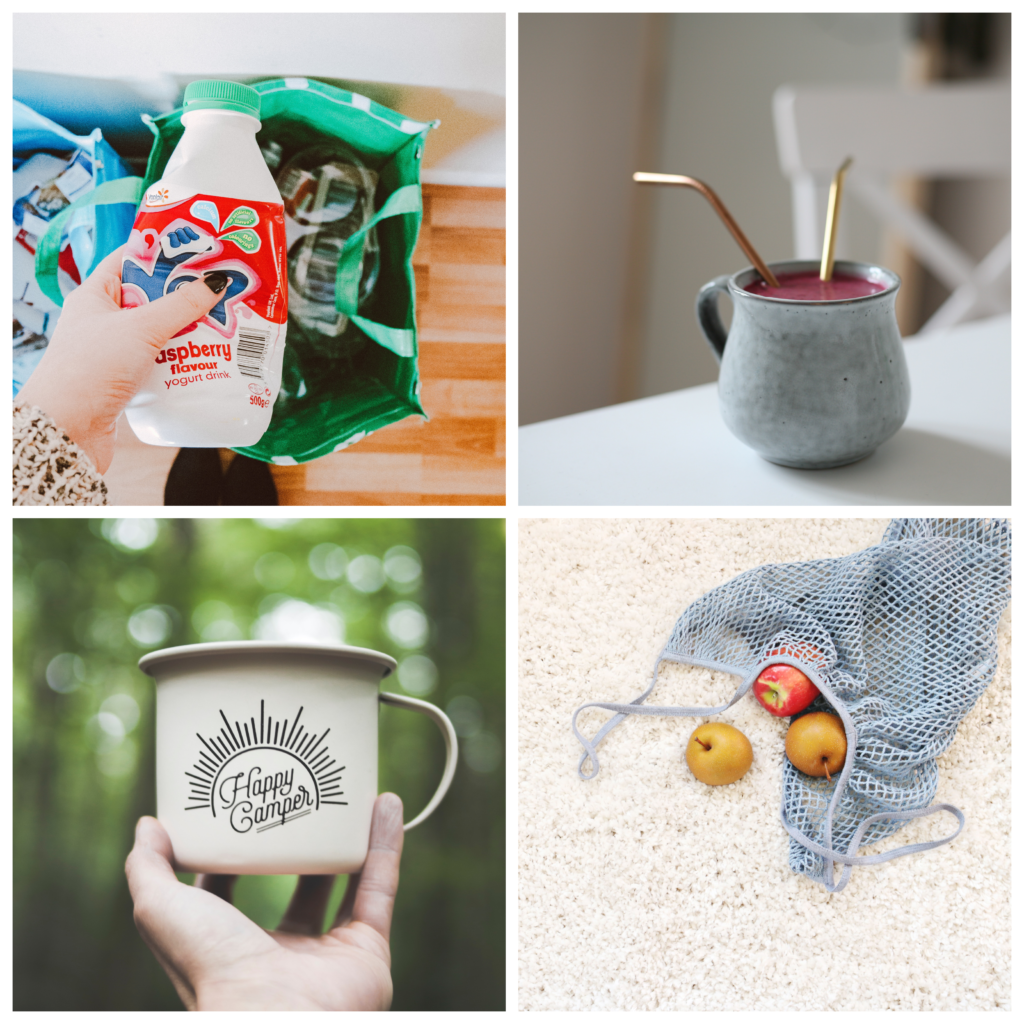
Replace Single-Use Plastic Straws With Reusable Straws
As with a lot of suggestions for overlanding, this tip involves leaving behind even more pesky plastic.
Plastic straws do not degrade and are truly unnecessary.
It’s an easy switch and a super simple solution.
We grabbed the Flathead Reusable Silicone Straws for our recent overland trip. They are perfect as you can purchase a bundle of 10 at a cheap price and carry them around with you wherever you go.
Eliminate Disposable Coffee Cups
It seems very convenient to grab a coffee while driving past endless coffee joints. And it’s easy for these styrofoam and plastic cups to accumulate in your car. Unfortunately, these containers wind up polluting the land and sea and take centuries to degrade.
It is estimated that approximately 3 billion coffees are sold in disposable cups each year.
These cups are not biodegradable, and they leave behind a polyurethane lining that lives longer than you.
Well, problem solved!
Simply brew your own coffee on the road using a simple coffee maker (we love a good percolator) and a mug.
Or if you are short on time (or space), carry a reusable travel mug with you. Most coffee shops have no issue filling up your mug for you.
We always travel with a reusable travel mug, whether on a day trip or a month long road trip. We love the Simple Modern Travel Mug mostly because they look super cool and come in tons of unique colours. But the added bonus with these are that they keep your coffee hot much longer than a disposable cup and they are spill proof! The perfect solution for life on the road.
Replace Plastic Bags with Reusable Shopping Bags
If you are not careful, plastic bags will pile up on you while on the road. These single-use plastic bags are one of the worst pollutants to date because they are ubiquitous and take centuries to break down.
This is an easy fix. Make sure to stock multiple reusable bags in your overland vehicle. They take up no room when they are folded down and are easy to grab anytime you go into a convenience store, grocery store or local market.
The next step in this category is to choose plastic-free foods while grocery shopping. Always opt for items packaged in recyclable cardboard cartons, tins, glass, and boxes as these are more environmentally friendly than plastic. Or better yet, shop in bulk food stores and bring in your own reusable storage containers.
Search for a Wet Wipe Alternative
A lot of people love the convenience of wet wipes because they can take care of all kinds of messes. And it may be tempting to grab a “biodegradable” brand. However, most of the biodegradable wipes wind up in sewers after being flushed down the toilet and become what is known as fatbergs.
Unfortunately, the next destination for these wet wipes is the ocean where it will take approximately 100 years for them to break down or worse, kill a sea creature that ingests it.
Luckily, we are in an age where there are tons of green alternatives for single-use products. If you are looking to replace wet wipes, try Bamboo Reusable Paper Towels. They work even better than a traditional paper towel, and each sheet can be washed and reused up to 85 times! Just think of all the waste saved from this one switch alone.
Use Natural, Mineral, Reef-Safe Sunscreen
You may be surprised by how many chemicals are in your typical sunscreen. Most popular sunscreen brands contain toxic substances that harm your body and wind up in waterways and poison the local flora and fauna.
Avoid sunscreens that contain the ingredients oxybenzone or octinoxate. And opt for natural, mineral sunscreens that use zinc oxide as their active ingredient.
Our go-to sunscreen is by Bare Republic. They have a huge range of mineral sunscreens that are reef-safe and skin-safe. They keep coming out with new innovative products like a tinted facial sunscreen, a shimmered body sunscreen and a smooth, whipped sunscreen. Check out their product line, they are a fantastic company!
Invest in High-Quality Camping Gear
It may be a hard hit in the beginning, but buying high-quality camping gear is worth the money. It will end up costing you more in the long run if you don’t invest in camping quality gear.
And these pieces of high-quality gear won’t end up in a landfill sooner than they should.
So make your goal for this year to invest in quality travel and overlanding gear, especially when it comes to clothing, footwear, portable fridges, sit-on kayaks and car tires.
Love the outdoors? Of course you do! While you’re here, check out our other outdoor posts:
- ‘How to Get in Shape for Hiking’
- ‘The Essential Backpacking Packing List’
- ‘The Ultimate Camping Packing List – With FREE Printable’
- ‘Healthy Food Ideas for Hiking’
- ‘Your Day Hiking Essentials Packing List’
Watch out for Vehicle Spills
A lot of overlanding pollutants come from vehicles that have leaks, especially from liquids like oil and coolant. Remember to thoroughly inspect your vehicle before going anywhere and to look for potential drips and leaks.
And when you are ready to have your oil change done, look for a company who will dispose of and recycle oils responsibly.
Beware of Fuel Spills at Gas Stations
Something many people don’t realize is that a lot of pumps around the world do not have an auto shut-off feature. Only fill your jerry cans and vehicle at genuine filling stations and always watch the amount in the container as it fills.
Overlanding is an awesome activity, and so is camping. This way of travel allows you to see more of the world and experience nature. But remember, you need to take care of that nature as well.
Do your absolute best to stay responsible and sustainable, lower your environmental impact by investing in eco-friendly practices and products, and know that green travel is possible!
What are your top tips for green travel? Let us know in the comments below! 😄
Love this post?? Share it on Pinterest!
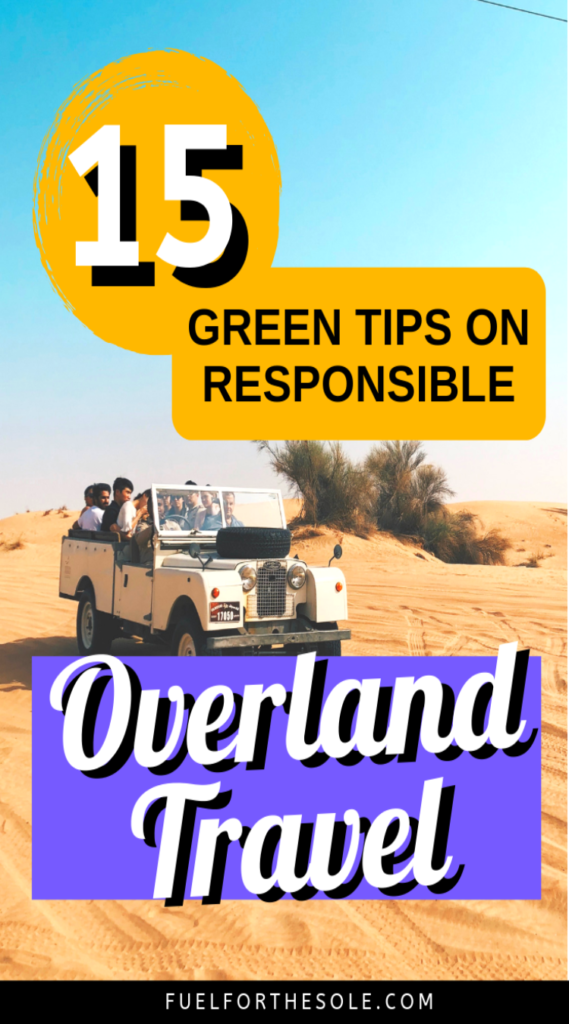
*This post may contain affiliate links that help to keep this blog running. Read our disclosure for more information.

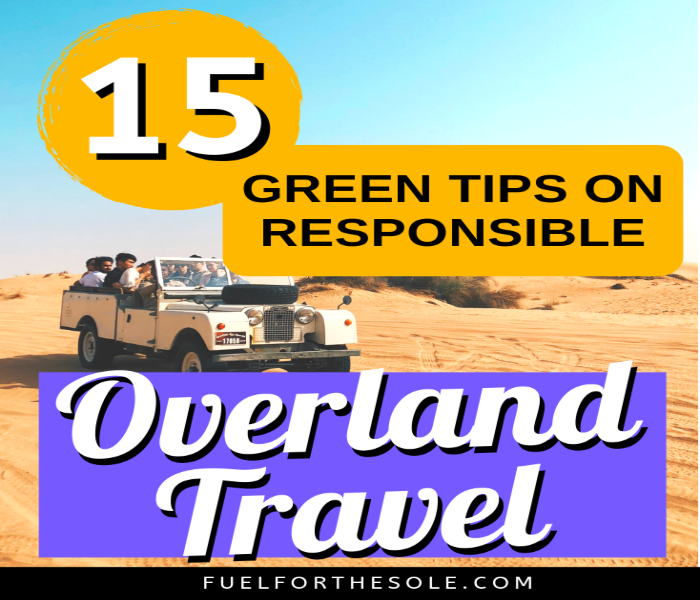
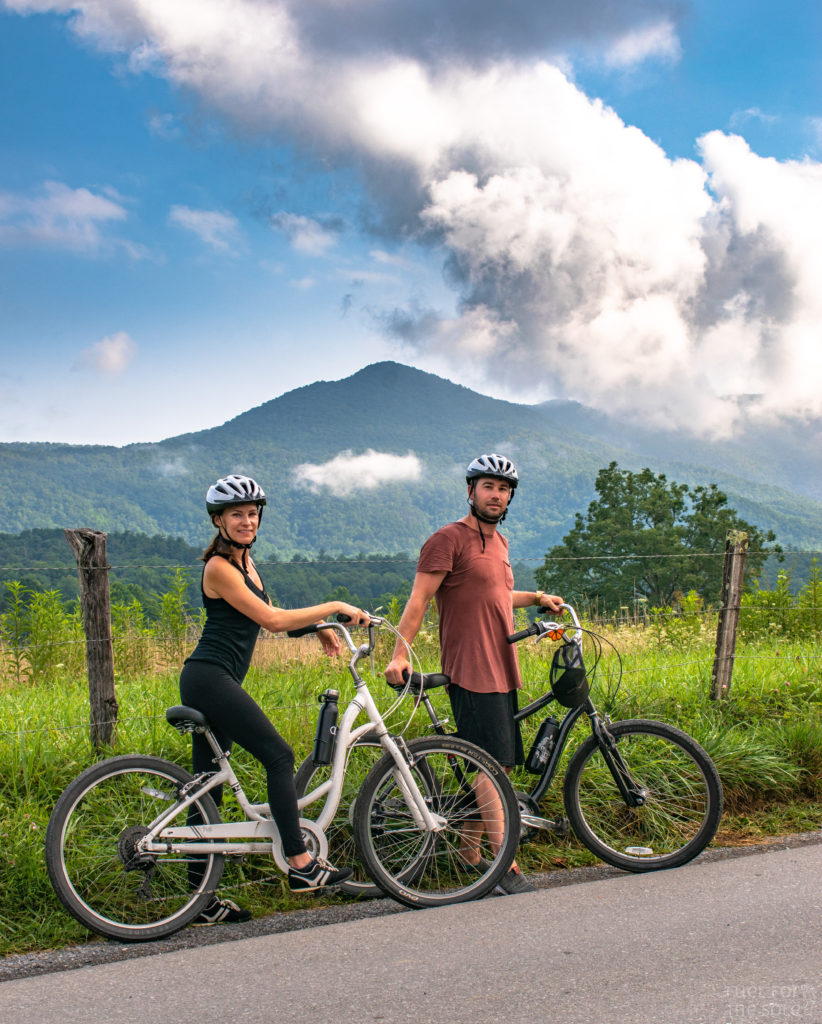
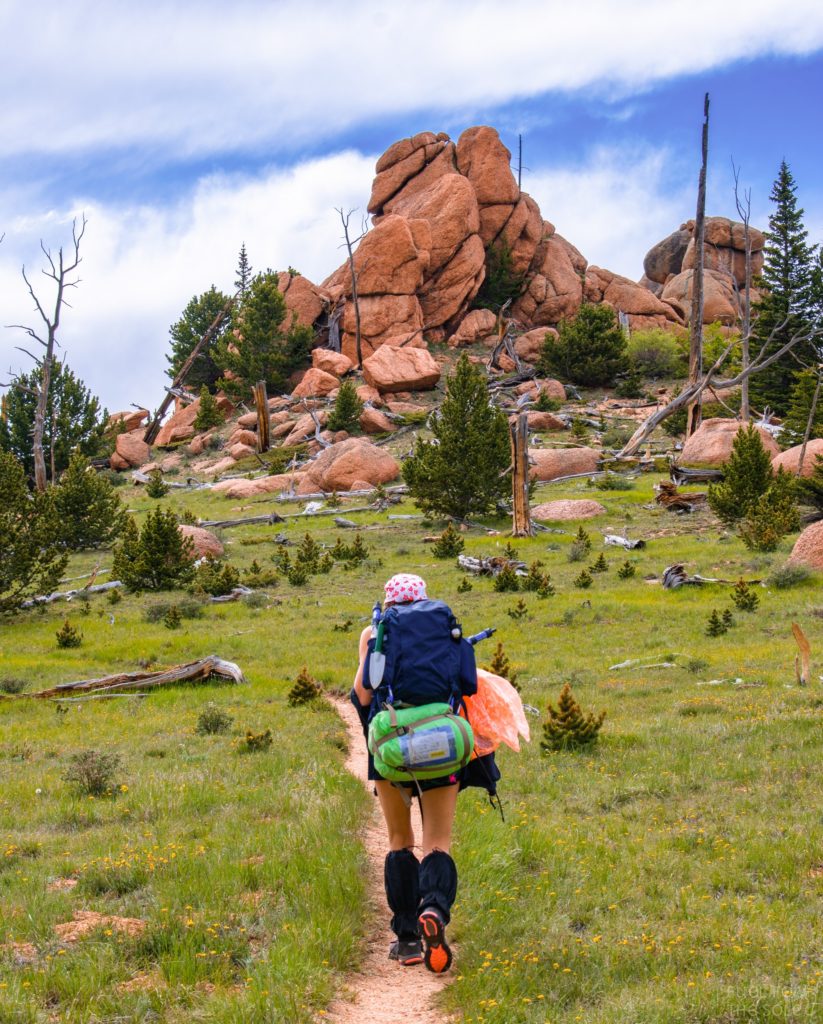
7 comments
[…] 15 Green Tips on Responsible Road Trips […]
[…] ‘15 Ways to Travel Responsibly While Overlanding’ […]
[…] ‘15 Ways to Travel Responsibly While Overlanding’ […]
[…] ’15 Green Tips on Responsible Overland Travel’ […]
[…] 15 Green Tips on Responsible Overland Travel […]
[…] 15 Green Tips on Responsible Overland Travel […]
[…] 15 Green Tips on Responsible Overland Travel […]